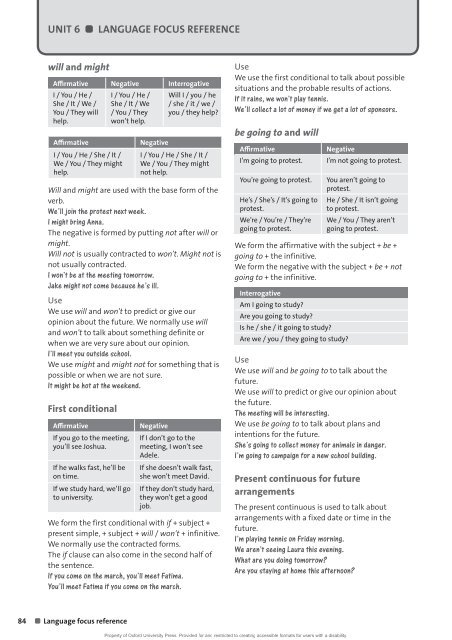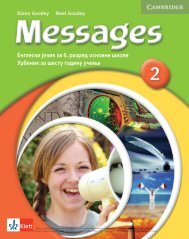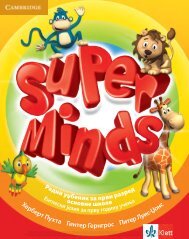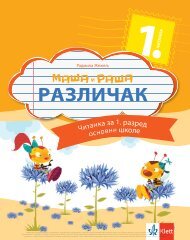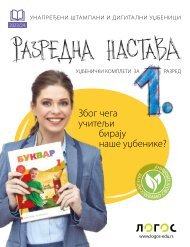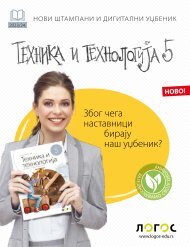Енглески језик 7, радна свеска, старо издање, Нови Логос
- No tags were found...
Create successful ePaper yourself
Turn your PDF publications into a flip-book with our unique Google optimized e-Paper software.
UNIT 6<br />
LANGUAGE FOCUS REFERENCE<br />
will and might<br />
Affirmative Negative Interrogative<br />
I / You / He /<br />
She / It / We /<br />
You / They will<br />
help.<br />
Affirmative<br />
I / You / He / She / It /<br />
We / You / They might<br />
help.<br />
I / You / He /<br />
She / It / We<br />
/ You / They<br />
won’t help.<br />
Negative<br />
Will I / you / he<br />
/ she / it / we /<br />
you / they help?<br />
I / You / He / She / It /<br />
We / You / They might<br />
not help.<br />
Will and might are used with the base form of the<br />
verb.<br />
We’ll join the protest next week.<br />
I might bring Anna.<br />
The negative is formed by putting not after will or<br />
might.<br />
Will not is usually contracted to won’t. Might not is<br />
not usually contracted.<br />
I won’t be at the meeting tomorrow.<br />
Jake might not come because he’s ill.<br />
Use<br />
We use will and won’t to predict or give our<br />
opinion about the future. We normally use will<br />
and won’t to talk about something definite or<br />
when we are very sure about our opinion.<br />
I’ll meet you outside school.<br />
We use might and might not for something that is<br />
possible or when we are not sure.<br />
It might be hot at the weekend.<br />
First conditional<br />
Affirmative<br />
If you go to the meeting,<br />
you’ll see Joshua.<br />
If he walks fast, he’ll be<br />
on time.<br />
If we study hard, we’ll go<br />
to university.<br />
Negative<br />
If I don’t go to the<br />
meeting, I won’t see<br />
Adele.<br />
If she doesn’t walk fast,<br />
she won’t meet David.<br />
If they don’t study hard,<br />
they won’t get a good<br />
job.<br />
We form the first conditional with if + subject +<br />
present simple, + subject + will / won’t + infinitive.<br />
We normally use the contracted forms.<br />
The if clause can also come in the second half of<br />
the sentence.<br />
If you come on the march, you’ll meet Fatima.<br />
You’ll meet Fatima if you come on the march.<br />
Use<br />
We use the first conditional to talk about possible<br />
situations and the probable results of actions.<br />
If it rains, we won’t play tennis.<br />
We’ll collect a lot of money if we get a lot of sponsors.<br />
be going to and will<br />
Affirmative<br />
I’m going to protest.<br />
You’re going to protest.<br />
He’s / She’s / It’s going to<br />
protest.<br />
We’re / You’re / They’re<br />
going to protest.<br />
Negative<br />
I’m not going to protest.<br />
You aren’t going to<br />
protest.<br />
He / She / It isn’t going<br />
to protest.<br />
We / You / They aren’t<br />
going to protest.<br />
We form the affirmative with the subject + be +<br />
going to + the infinitive.<br />
We form the negative with the subject + be + not<br />
going to + the infinitive.<br />
Interrogative<br />
Am I going to study?<br />
Are you going to study?<br />
Is he / she / it going to study?<br />
Are we / you / they going to study?<br />
Use<br />
We use will and be going to to talk about the<br />
future.<br />
We use will to predict or give our opinion about<br />
the future.<br />
The meeting will be interesting.<br />
We use be going to to talk about plans and<br />
intentions for the future.<br />
She’s going to collect money for animals in danger.<br />
I’m going to campaign for a new school building.<br />
Present continuous for future<br />
arrangements<br />
The present continuous is used to talk about<br />
arrangements with a fixed date or time in the<br />
future.<br />
I’m playing tennis on Friday morning.<br />
We aren’t seeing Laura this evening.<br />
What are you doing tomorrow?<br />
Are you staying at home this afternoon?<br />
84 Language focus reference<br />
Property of Oxford University Press. Provided for and restricted to creating accessible formats for users with a disability.


